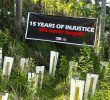
Terrorized. Members of the Suara Bangsamoro partylist group hold a demonstration on Friday against the anti-terrorism bill. (davaotoday.com photo by Barry Ohaylan)
By Grace S. Uddin
davaotoday.com
DAVAO CITY — Three months ago, Naif Yaken applied for a job in one of the plywood companies here. The work was simple: all Yaken had to do was stick the plywood together.
But the 20-year-old Moro, who supports his parents and four siblings, did not get the job. A man who applied at the same time with Yaken got it instead. Yaken now speculates that, had it not been for his religion, which is Islam, he would have gotten the job.
Related item: Terror Law Undermines Efforts for Justice and Peace in Mindanao

Terrorized. Members of the Suara Bangsamoro partylist group hold a demonstration on Friday against the anti-terrorism bill. (davaotoday.com photo by Barry Ohaylan)
Yaken believes that he was a victim of discrimination. �Moro people are put in a bad light nowadays because they are often depicted in the news as being involved in detestable activities,� he said. The company, he reckoned, must have decided to reject his application and accept the non-Moro applicant based on this prejudice.
A few days ago, Yaken gave vent to his frustration by joining a demonstration at the Mini-Forest Gym along Boulevard, this city, against the passage by the Philippine Senate of the anti-terrorism bill, which has been renamed Human Security Act.
He is convinced that the discrimination against Muslims like him would worsen if the bill is signed by President Gloria Macapagal-Arroyo into law and then implemented by law enforcers whose history of bias against Muslims in this country is, according to Filipino Muslim groups, notorious.

Discriminarted against. Naif Yaken believes that he did not get the job because of his being a Muslim. (davaotoday.com photo by Barry Ohaylan)
Armed with this law, law enforcers � who can arrest and detain suspects even without a warrant or a formal charge � can abuse Muslims even more, Yaken said. �I am afraid about reckless arrests just because a person has the supposed look of a terrorist,� he said, echoing the Muslim community� worry about racial or religious profiling, which worsened around the world since 9/11.
�Do we look like terrorists?� Roel Sang, another Moro and a friend of Yaken�s, quipped during an interview at the demonstration on Friday. He pointed at Yaken, whom he described as goodlooking and �cannot be mistaken for a terrorist.�
But they�re worried because, with the new law, nothing could be certain and safe. It is no longer just about how one looks, Sang said. Perhaps, he added, the tendency by law enforcers to indiscriminately accuse Filipino Muslims of being terrorists would worsen.
�We feel insulted every time one of our brothers is caught and imprisoned for no valid reason,� Yaken said.
Herrmeinn Arendain, a spokesman for Suara, a Moro partylist group, said the anti-terrorism bill will certainly worsen their situation. As it is, he said, there are already cases of abductions, illegal arrests, and other violations of human rights against Muslims.

Terrorized. A member of the Suara Bangsamoro partylist group during a demonstration on Friday against the anti-terrorism bill. (davaotoday.com photo by Barry Ohaylan)
Arendain mentioned the cases of Sabdurah Allah and Rahman Camili, who were abducted, believed to be by state security forces, but were never charged in court.
�The Moro people have always been accused of terroristic acts by the state, implicating them in various crimes such as bombings, hostages and killings, often without sufficient evidence,� he said.
Arendain denounced the practice by the government to often use Moro suspects as scapegoats for crimes. (Grace Uddin/davaotoday.com)
[tags]davao today, mindanao, moros, muslim, peace process, mindanao conflict, suara bangsamoro, terrorism, anti-terrorism bill, gloria macapagal-arroyo, philippines[/tags]
Terrorism









